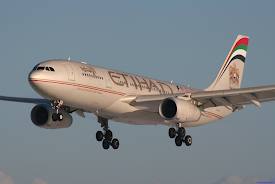 Abu Dhabi, Jan 12: The UAE carriers Emirates and Etihad Airways have been rated among the top four airlines in the world in terms of safety and offering in-flight products in a survey conducted among 448 airlines.
Abu Dhabi, Jan 12: The UAE carriers Emirates and Etihad Airways have been rated among the top four airlines in the world in terms of safety and offering in-flight products in a survey conducted among 448 airlines.
Top of the list is Qantas which has a fatality free record in the jet era (since 1951), followed by Air New Zealand, Emirates and Etihad Airways.
Making up the top ten with seven stars for safety and in-flight product are in alphabetical order: Air New Zealand, All Nippon Airways, Cathay Pacific Airways, Emirates, Etihad Airways, Eva Air, Royal Jordanian, Singapore Airlines and Virgin Atlantic.
AirlineRatings.com’s rating system takes into account a number of different factors related to audits from aviation’s governing bodies and lead associations as well as government audits and the airline’s fatality record.
Of the 448 airlines surveyed, 137 have the top seven-star safety ranking, but almost 50 have just three stars or less.
Qantas was the lead airline with real time monitoring of its engines across its fleet using satellite communications, which has enabled the airline to detect problems before they become a major safety issues.
2013 safety year since 1945
And 2013 was the safest for flying since 1945, with only 269 deaths from 29 accidents.
According to the Aviation Safety Network the results are well below the 10-year average of 32 accidents and 719 fatalities.
The worst accident was the crash of a Tatarstan Boeing 737-500 operating Flight U9-363 from Moscow to Kazan, which killed all 44 passengers and six crew aboard. The 737-500 was on its second approach to land in strong winds on November 17 and was about to go around for a third time when it hit the runway and exploded in flames.
Tatarstan, a small regional airline from central Russia has not completed the critical International Air Transport Association Operational Safety Audit (IOSA). Airlines that have completed IOSA have a safety record 77 per cent better than those which have not.
On October 17, 49 passengers and crew lost their lives when a Lao Airlines ATR72 crashed while on approach to Pakse in Laos. Flight QV301 left Vientiane almost four hours late because of bad weather at the destination airport. It took off at 2.45pm local time and on descent to land hit a severe rain squall associated with tropical storm Nari which had battered the Philippines.
Like Tatarstan, Lao Airlines was only rated as a four-star (out of seven) airline by AirlineRatings.com in part because it had not completed IOSA. Other major airlines in SE-Asia that have not completed IOSA include; Air Bagan; Cebu Pacific; Lion Air and Merpati Air.
The most miraculous escape was for the 304 passengers and crew that walked away from the spectacular crash of the Asiana Boeing 777 at San Francisco International Airport in July. Only three passengers died, when the Boeing 777 hit the runway sea wall and flipped over.
Worst Crashes
Date Aircraft Airline Fatalities Location
Jan 29 CRJ SCAT 21 Almaty Airport. Kazakhstan
July 7 DHC-3T Turbine Otter Rediske Air 10 Soldotna Airport, USA
Oct 3 Embraer Brasilia Associated 16 Lagos, Nigeria
Oct 14 Cessna 208B AereoServicio 14 Loreto Airport. Mexico
Oct 16 ATR-72-212A Lao Airlines 49 Pakse Airport, Laos
Nov 17 Boeing 737 Tatarstan 50 Kazan Airport. Russia
Nov 29 Embraer ERJ 190 LAM 33 Bwabwata NP Zambia
Ten Best Airlines
1. Qantas
2. Air New Zealand
3. Emirates
4. Etihad
5. Cathay Pacific
6. Singapore Airlines
7. Virgin Atlantic
8. EVA Air
9. All Nippon Airways
10. Royal Jordanian





Comments
Add new comment